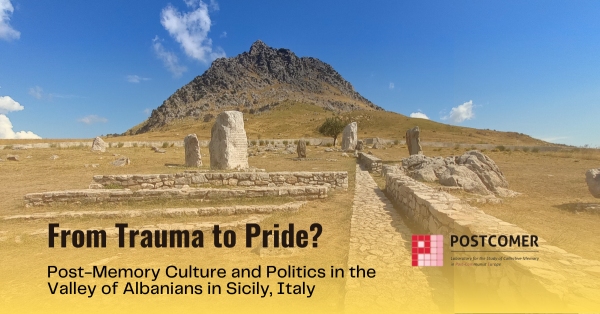Postcomer. New Project: From Trauma to Pride? Post-Memory Culture and Politics in the Valley of Albanians in Sicily, Italy
From Trauma to Pride?
Post-Memory Culture and Politics in the Valley of Albanians in Sicily, Italy
This small-scale project aims to investigate the post-memory culture and politics in the "Valley of Albanians" – Sicily’s famous municipality home to the Arbereshe community. From the perspective of young generations, this research precisely looks at how post-memory generations recollect and care about the events of the Portella della Ginestra massacre of 1947 and whether this critical event continues to provide, if at all, new venues for exploring the local identity, language, and sense of belonging to Arbereshe culture.
The research is being conducted by dr. Francesco Trupia and Prof. Agata Domachowska from POSTCOMER at the Nicolaus Copernicus University in Toruń, Poland, and facilitated by the international cooperation with Prof. Mandala and Prof. Gurga from the Department of Culture and Society of the University of Palermo, Italy.
A brief historical background
The Portella della Ginestra massacre refers to the killing of 11 people and 27 wounded during the celebration of traditional Labour Day on the 1st May 1947 in Sicily. While hundreds of primarily poor peasants gathered at Portella della Ginestra, the speech held by the Communist party secretary was interrupted by gunfire from the surrounding hills, as well as by men on horseback. Among the eleven people killed, including three teenagers and one child were killed. Other twenty-seven people were wounded, including a little girl who had her jaw shot off.
The shooting was attributed to the separatist leader Salvatore Giuliano and his band of subordinates who had risen to prominence in the disorder that followed the Allied invasion of Sicily in 1943. The scope of the shooting had been to punish the rising socialist and communist organisations that had engaged in local struggles for land rights and land reform after winning the local elections during the post-Fascist predicament.
The massacre soon polarised the political landscape in Sicily and Italy as a whole. The leftist organisations called for a general strike in solidarity with the victims and workers, accusing the Mafia of being the perpretaros and the fifth column of local landowners, monarchists and the rightist organisations. The then-Minister of Interior, the Christian Democrat Mario Scelba, undermined the political significance of the massacre.
Methodology and Research Questions
Portella della Ginestra is a natural valley characterised by calcareous stones, geographically surrounded by the Kumeta, Maja, and Pelavet mountains (as typically referred to in the Arbereshe language), and in between Piana degli Albanesi and San Giuseppe Jato, a few kilometers from Palermo.
This small-scale project is being implemented through an ethnographic approach to studying traumas, post-memory, and memory politics. Data and first-hand information will be collected “from below” through the participation-observation method to combine with focus groups with members of post-memory generations and interviews with local historians. During the fieldwork, visual ethnography will be employed to explore further the local places of memory and traumas.
In the attempt to execute qualitative empirical research on a micro-level, focus groups wil be guided by open questions. As follows:
1) What is the first memory of Portella della Ginestra massacre among post-memory generations in Piana degli Albanesi?
2) From whom this memory is passed, and when/where is it acquired?
3) Do post-memory generations participate in the annual commemoration of the victims of 1947?
4) If at all, how do post-memory generations liken the history of Piana degli Albanesi to the massacre of innocents that happened at Portella della Ginestra in 1947?
Information:
Supervisor: dr hab. Agata Domachowska, prof. UMK Nicolaus Copernicus University in Toruń,
tel.: +48-56-611-3546 e-mail: a.domachowska@umk.pl
Researcher: dr. Francesco Trupia, postdoc Nicolaus Copernicus University in Toruń
tel. +48 452 470 432 email: trupia@umk.pl

.jpg)
